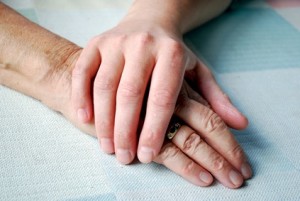 When someone is diagnosed with multiple sclerosis it affects not only their life, but it also deeply affects the lives of the people around them. It would be nice if we were handed an instruction manual on how to navigate these situations, but unfortunately we are usually left to figure it out for ourselves. Friends and family of people with MS often ask me what they can do to help, or what the right thing to say is, but unfortunately this is tricky advice to dispense. There is no cookie-cutter answer that perfectly fits every person, and every situation that MS throws our way. There are however, a few brief tips that I can offer:
When someone is diagnosed with multiple sclerosis it affects not only their life, but it also deeply affects the lives of the people around them. It would be nice if we were handed an instruction manual on how to navigate these situations, but unfortunately we are usually left to figure it out for ourselves. Friends and family of people with MS often ask me what they can do to help, or what the right thing to say is, but unfortunately this is tricky advice to dispense. There is no cookie-cutter answer that perfectly fits every person, and every situation that MS throws our way. There are however, a few brief tips that I can offer:
Show up. Even if you don’t know what to say or how to act, just show up and be there. Sit, nap, laugh, cry, or curse with us! The most painful part of my diagnosis was having some of the people who I thought were close friends disappear from my life when I needed them the most. Luckily many of my fabulous friends and family did the exact opposite, and rushed to my side. I can’t remember every little thing they did and said to me during that period, but they showed up and that is what I remember years later. If you can’t be there in person just call, or even send a card to let that person know that you are thinking of them. Trust me, it never goes unnoticed.
Lend a hand. Offer to run errands so they can get some rest or help out with meals, babysitting, or housework. This can be a huge help, especially during a relapse or a particularly bad day!
Ask questions. Ask your loved one how they are feeling, about their symptoms, and if they want to talk about anything. Don’t simply ask “how are you?”, but instead say “how are your symptoms today?” or “I know you had a doctor’s appointment this morning, I just wanted to check in and see how it went.” Showing interest and making an effort to learn more about MS also shows us that your are interested and invested in our well-being.
Remember that we are still the same person you know and love. When I was first admitted to the hospital I was terrified. I didn’t know what was going on or what my future held, but when a friend walked through the door of my hospital room with a cup of coffee, my favorite munchies, and a movie it made the world seem right for a moment. The things I loved before my diagnosis are still the things that make me smile, and having a little bit of normalcy can be really important!
Cheer us on! The reality is, sometimes this disease just sucks. We are going to have symptoms and bad days. Sometimes it’s tough to rally and go to battle with our MS, and it really helps to have some cheerleaders on the sidelines during those times!
Forgive us if we are a bit self-obsessed for awhile. Believe me, an MS diagnosis completely consumes you for some time. We may not be great at asking how your day was, or about the things going on in your life. We probably don’t even realize that we are doing it either. Over time just start telling us about what’s going on with you anyway, and help snap us out of our MS tunnel vision.
Recognize that MS symptoms are often invisible. Telling your loved one that they look good may seem like a perfectly reasonable thing to say, but sometimes it can belittle the internal struggle that a person with MS faces. Instead try “You look great today, but how are you feeling?”.
Don’t dispense medical advice unless you also happen to be a neurologist. It’s not comforting to hear about the fad diet/miracle pill that “cured” your aunt’s friend’s next-door neighbor. We recognize that you are trying to be helpful, but stopping to listen and learn about MS would be a much better alternative.
If you still aren’t sure what to do, or how to help try asking…we just might have some suggestions for you!
Article by:
 Stephanie Buxhoeveden MSCN, FNP-BC Stephanie is a nurse practitioner who was diagnosed with MS at age 25. Shortly after being diagnosed she realized she could use her experiences as a patient to make a difference in the lives of others, so she became a multiple sclerosis certified nurse. Stephanie completed her master’s in nursing at Rutgers University, and now specializes in the care of people with MS and other neurological diseases.
Stephanie Buxhoeveden MSCN, FNP-BC Stephanie is a nurse practitioner who was diagnosed with MS at age 25. Shortly after being diagnosed she realized she could use her experiences as a patient to make a difference in the lives of others, so she became a multiple sclerosis certified nurse. Stephanie completed her master’s in nursing at Rutgers University, and now specializes in the care of people with MS and other neurological diseases.
Her blog, www.justkeepsmyelin.com, offers a unique perspective on MS from both a healthcare provider’s point of view, and through the eyes of a person living with the disease every day. Her mission is to bring compassion, humor, and a deeper understanding of MS to anyone who reads it. She also writes for MultipleSclerosis.net, MSFocus Magazine, serves as a District Activist Leader for the National MS Society and is on the membership committee of iConquerMS.
To learn more about MS HOPE Foundation and to keep up with the latest MS news and research, follow us on Facebook, Twitter, and Instagram.
Tags: about ms, family health, support


Thanks for this article. My wonderful son (age 47) was diagnosed with MS in 2008. The first year he lost his health, his job, his relationship, and most importantly his independence. The MS has progressed and he becomes more and more isolated. People don’t mean to be unkind but somehow that’s the way it turns out. Very few visit or even consider his situation when events and holidays come up. It is difficult, I know, for others to see him as he is now compared to the dynamic, outgoing, highly successful person they knew in the past. What they don’t understand or take in to consideration is that he is more aware of that than they are and dying a little inside each day he spends in this isolation that has become his life. He is horribly depressed and finding a therapist or doctor that “gets it” when it comes to MS is nearly impossible. We limp along together because I am determined that his life will get as good as we can get it until I can’t anymore. He has earned the right to keep his dignity, to know his life is still worthwhile and be reminded every day that he is loved. This disease is a thief of the worst kind…it robs the person of their hopes and dreams. I try every day to encourage coming up with a revised version of those hopes and dreams because he is still that phenomenal human being my husband and I created out of our love 47 years ago. My comment really is…if you know someone with MS be kind, supportive and tolerant. Your article articulates so well the many facets of MS that friends and loved ones should know about. Thank you.